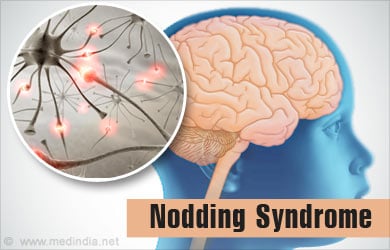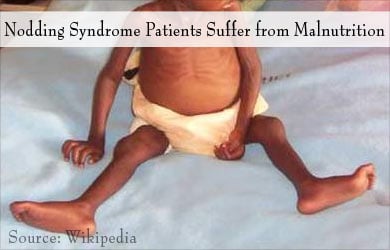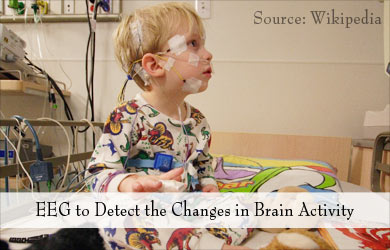- Wamala JF, Malimbo M, Tepage F, Lukwago L, Okot CL, Cannon RO, et al. (2015) Nodding Syndrome May Be Only the Ears of the Hippo. PLoS Negl Trop Dis 9(8): e0003880. doi:10.1371/journal.pntd.0003880
- Kakooza-Mwesige A, Dhossche D (2012) Nodding Syndrome in Ugandan Children and Adolescents: Menage A Trios of Epilepsy, Autism, and Pediatric Catatonia. Autism 2:e112. doi:10.4172/2165-7890.1000e112
- Piloya-Were T, Odongkara-Mpora B, Namusoke H and Idro R. Physical growth, puberty and hormones in adolescents with Nodding Syndrome; a pilot study. BMC Research Notes 2014, 7:858; doi:10.1186/1756-0500-7-858
What is Nodding Syndrome?
Nodding Syndrome or nodding disease is an illness affecting the nervous system that results in bouts of head nodding in a person who has been previously normal. Head nodding has been defined by the World Health Organization as “repetitive involuntary drops of the head towards the chest on two or more occasions”.
Nodding syndrome has been noted in some parts of the African countries of Sudan, Uganda and Tanzania. It has been suggested that nodding syndrome is a severe form of epilepsy, caused by onchocerciasis. Children between the ages of 5 and 15 years are usually affected.

What are the Causes of Nodding Syndrome?
Nodding syndrome is a neurological condition where the brain is affected. Changes in the brain have been noted on MRI in some patients.
The exact cause of nodding syndrome is not known though several have been suggested ranging from infections and nutritional disorders, to contamination from military ammunition that people in war-torn areas are exposed to.
Cases of nodding syndrome have been noted in places endemic for onchocerciasis, thus raising the possibility that it may be caused by it. Onchocerciasis or river blindness is caused by the filarial parasite, Onchocercia volvulus. It spreads through the bite of the blackfly and causes symptoms mainly affecting the skin and eye. The number of new cases of nodding syndrome have reduced in areas where ivermectin has been used to prevent onchocerciasis and large-scale measures have been adopted to deal with the blackfly. This further suggests that onchocerciasis and nodding syndrome are probably related. However, the filarial parasite usually does not infect the brain. Therefore, additional studies are required to determine the exact cause of nodding syndrome.
Children may probably be affected because their brain and immune system are immature, and they are exposed to high amounts of onchocerciasis parasites.
What are the Symptoms of Nodding Syndrome?
Nodding syndrome only affects children. Symptoms of nodding syndrome include the following:
Episodes of repeated head nodding:
- The nodding occurs around 5 to 20 times a minute
- The episode may be triggered by food or cold weather
- Awareness may be reduced during the episode and the child may not respond to commands
- The nodding may progress to seizure that grips the entire body
Other changes noted include:
- Failure to grow and develop of secondary sexual characters
- Malnutrition, since the child cannot eat as nodding that starts in the presence of food

- Repeated infection
- Decrease in intelligence
- Social withdrawal
- Death, which may sometimes occur due to accidents like burning and drowning resulting from seizures that accompany nodding syndrome
How is Nodding Syndrome Diagnosed?
Nodding syndrome is diagnosed based on history and physical examination of the patient. Some changes also noted in patients with nodding syndrome are listed below, but these cannot be used in definite diagnosis of the condition.
- Autoantibodies called leiomodin-1 have been detected in the blood and CSF of some patients with nodding syndrome, though their significance is not known.
- Filarial parasite was often present in the blood of patients with nodding syndrome
- Changes in EEG are noted during the episodes

How do you Treat Nodding Syndrome?
There is no specific treatment for nodding syndrome. Treatment includes:
- Anti-seizure medication, to control the episode
- Adequate nutrition, to prevent malnutrition
How do you Prevent Nodding Syndrome?
Since the exact cause of nodding syndrome is not known, methods to prevent it are not known. However, control of onchocerciasis with ivermectin and control of blackflies may help prevent nodding syndrome. Other steps to prevent bites of blackflies in endemic areas include:
- Cover the body well leaving minimal exposed areas. Wear long-sleeved shirts and long pants. Cover your feet well with socks and shoes
- Use approved insecticides or repellents on the exposed parts of the skin

- Wear clothes that are pre-treated with permethrin to keep the blackflies away
- Since the blackfly bites during the day, make sure you take adequate precautions during the day
Health Tips
Nodding syndrome affects children in rural areas, and is often considered as a social stigma. Therefore, the following measures are necessary for the affected child as well as the family:
- Emotional support for the affected child and the family
- Physical and social rehabilitation for the child
- Health education to the family and the general public about the disease






